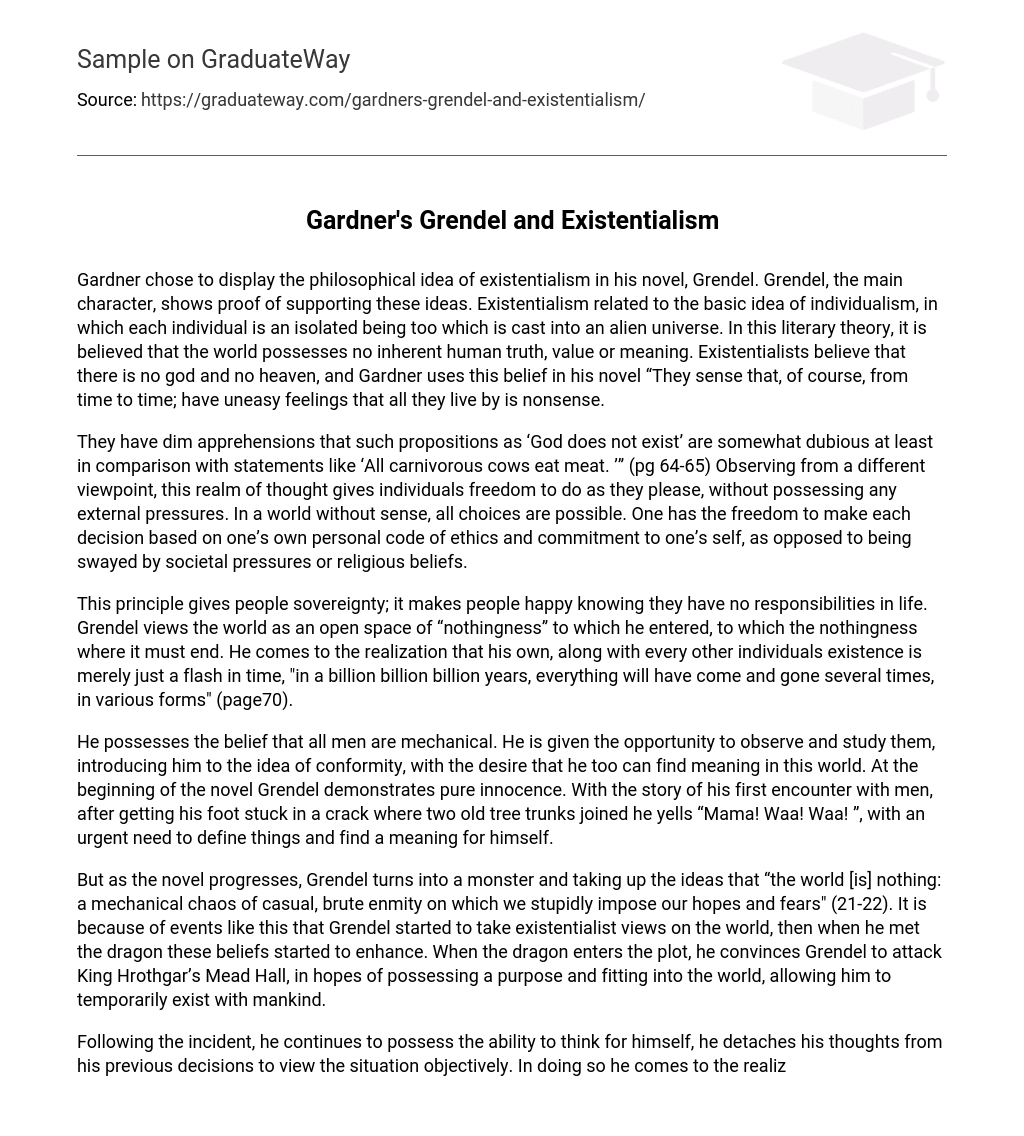In his novel, Grendel, Gardner chooses to portray the concept of existentialism philosophically. The protagonist Grendel provides evidence of supporting these ideas. Existentialism is connected to the fundamental idea of individualism, where each person is a solitary being thrown into a strange world. According to this literary philosophy, there is no inherent truth, value, or purpose in the world. Existentialists reject the existence of a god and heaven, and Gardner incorporates this belief in his novel as well: “They sense that, of course, from time to time; have uneasy feelings that all they live by is nonsense.”
The text suggests that people have vague doubts about propositions such as ‘God does not exist,’ especially when compared to statements like ‘All carnivorous cows eat meat.’ Looking at it from another perspective, this realm of thought allows individuals to act freely without external influences. In a nonsensical world, all choices become available. Each decision can be made according to one’s own personal morals and dedication to oneself, rather than being influenced by society or religious convictions.
The principle of sovereignty brings happiness to people by relieving them of life’s responsibilities. Grendel perceives the world as a vast void that he entered and where it will ultimately cease to exist. He acknowledges that his own and everyone else’s existence is fleeting, as everything will come and go multiple times in different forms in billions of years.
He believes that all men are mechanical and has the chance to observe and study them, exposing him to the concept of conformity and hoping to find meaning in the world. At the start of the novel, Grendel shows complete innocence. When he gets his foot stuck in a crack between two old tree trunks, he cries out “Mama! Waa! Waa!” desperately seeking to define things and establish his own purpose.
However, as the story unfolds, Grendel undergoes a transformation and adopts the belief that “the world [is] nothing: a mechanical chaos of casual, brute enmity on which we stupidly impose our hopes and fears” (21-22). This shift in perspective occurs due to certain events that Grendel experiences, causing him to develop existentialist views about the world. When Grendel encounters the dragon, these beliefs are further strengthened. The dragon persuades Grendel to attack King Hrothgar’s Mead Hall, with the aim of finding a purpose and fitting into the world, allowing Grendel to temporarily coexist with humanity.
After the incident, he still maintains his individual thinking ability but separates his thoughts from past choices to objectively evaluate the situation. Consequently, he recognizes that he will never fully fit into this world and experiences a sense of being trapped and empty. He envisions himself as a monster, killing men. Struggling to maintain his mental well-being, Grendel realizes that he cannot persist in this solitary existence.
The protagonist’s depression leads him to reject his role as a monster and refuse to kill both Unferth and Wealtheow, realizing it is pointless. He yearns to give his life meaning. But it is only when he surrenders to Beowulf, allowing him to tear his arm off, that he achieves genuine happiness and fulfills his “design.” Grendel’s quest for purpose contradicts existentialist beliefs.
Throughout the novel, Grendel undergoes numerous transformations, from the beginning to the middle and all the way to the end. In the middle of the story, Grendel embraces existentialism due to his senseless killings. These killings lack purpose; he is simply lost in his confusion about life and follows others’ instructions to kill. However, as Grendel starts thinking independently, he realizes that killing serves no purpose. At this point, he chooses not to be a monster. This decision differentiates him from a true monster who derives pleasure from killings and sees them as victories. Therefore, Grendel’s refusal to find joy in his kills ultimately proves that he is not a monster.





